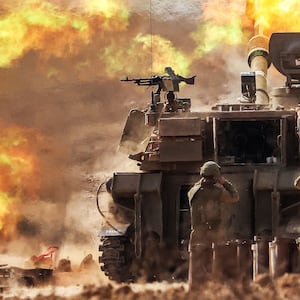An Israeli airstrike on the largest refugee camp in the Gaza Strip on Sunday killed at least 30 people, most of them women and children, Al Jazeera reported, citing Gaza’s Ministry of the Interior. At least 27 more people were injured.
In recent days, health officials in Gaza have collected so many bodies that, after Israeli airstrikes over the weekend killed well over 100 people, they no longer have enough shrouds for the dead.
“We’ve been here since the crack of dawn and the bodies have completely filled the hospital yard, on top of the bodies which are in refrigerators which are full, inside the hospital building and outside,” a staff member helping to transport bodies told the BBC.
“We don’t have enough shrouds for the bodies because the numbers are huge. All bodies are arriving in parts, unattached and in pieces. We can’t identify them because the bodies have been disfigured and crushed.”
The scenes of horror and hospital beds full are the latest in the barrage of violence to hit Gaza since Hamas terrorists invaded Israel earlier this month. Since the Oct. 7 attack that killed more than 1,400 people in Israel, Gaza’s health ministry claimed Israeli airstrikes have killed more than 4,700 people, according to Reuters. Hamas has also taken 212 people hostage.
It is also violence that will continue, officials have said. Israel maintained its position for a planned ground offensive, with Israeli Defense Forces (IDF) soldiers engaging in a raid on Sunday near the area of Kibbutz Kissufim in preparation for the assault. One IDF soldier was killed while three were injured, an IDF spokesman said, according to CNN.
The Egyptian military confirmed injuries among its border guards on Sunday after the IDF admitted that one of its tanks had “accidentally” fired at Egyptian positions near the Gaza-Egypt border.
A spokesperson for the Egyptian army said that fragments of a shell had caused “minor” wounds among the border guards, without providing more details.
The independent Egyptian news outlet MadaMasr, however, reported that nine Egyptian nationals had been injured in the incident near the Rafah border crossing, adding that ambulances carried the wounded guards away to a nearby hospital, according to Egyptian officials quoted anonymously by the outlet.
In a statement about the incident, the Israeli military apologized for the strike.
“A short while ago, an IDF tank accidentally fired and hit an Egyptian post adjacent to the border in the area of Kerem Shalom. The incident is being investigated and the details are under review,” the IDF said in a statement posted to X. “The IDF expresses sorrow regarding the incident.”
The border incident comes after Israel launched its first missile strike on the West Bank from a warplane in nearly two decades on Sunday, as its planned ground offensive appeared ever more imminent.
The warhead struck a mosque at a refugee camp in Jenin that the Israeli Air Force said was sheltering members of Hamas, according to Haaretz. Those hit were a “ticking time bomb” that “planned to commit a murderous attack in Israeli territory,” an Israel Defense Forces spokesman said. Israel had begun drone strikes in the West Bank in July after a similar lull in bombings.
The attack left two Palestinians dead, the Palestinian Health Ministry told Haaretz, while another three were killed by IDF strikes on Jenin, Nablus, and Tubas. More than 100 Palestinians have been killed by Sunday afternoon from Israeli airstrikes, the ministry said.
The Palestinian Foreign Ministry blasted the attack as a “dangerous escalation in the use of warplanes,” according to The New York Times.
Iran warned Israel and the U.S. on Sunday that its pursuit of justice could throw the entire Middle East into turmoil. “If they do not immediately stop the crime against humanity and genocide in Gaza, anything is possible at any moment and the region will go out of control," Iranian Foreign Minister Hossein Amir-Abdollahian said at a joint news conference in Tehran, according to the BBC.
The attacks also came after 20 trucks of aid provided by the United Nations and the Egyptian Red Crescent drove into Gaza from Egypt on Saturday, the first stream of relief for Palestinians whose resources were cut off by Israel earlier this month. The supplies included items such as pasta, drinking water, and canned tuna, though it did not include fuel. Israel cut off Gaza’s fuel supply shortly after the war began.
Several U.N. agencies including the U.N. Children’s Fund and the World Health Organization warned the convoy, however, was “not enough,” saying in a statement the humanitarian crisis in Gaza had reached “now catastrophic” levels.
“The world must do more,” the agencies said.






